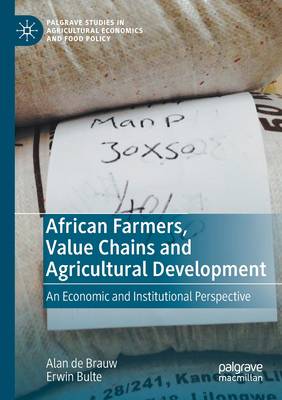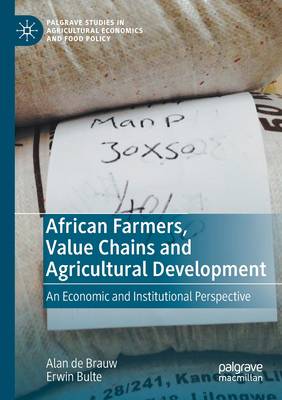
- Afhalen na 1 uur in een winkel met voorraad
- Gratis thuislevering in België vanaf € 30
- Ruim aanbod met 7 miljoen producten
- Afhalen na 1 uur in een winkel met voorraad
- Gratis thuislevering in België vanaf € 30
- Ruim aanbod met 7 miljoen producten
Zoeken
African Farmers, Value Chains and Agricultural Development
An Economic and Institutional Perspective
Alan de Brauw, Erwin Bulte
€ 137,45
+ 274 punten
Uitvoering
Omschrijving
This book provides a thorough introduction to and examination of agricultural value chains in Sub-Saharan Africa. First, the authors introduce the economic theory of agri-food value chains and value chain governance, focusing on domestic and regional trade in (and consumption of) food crops in a low-income country context. In addition to mainstream and heterodox thinking about value chain development, the book pays attention to political economy considerations. The book also reviews the empirical evidence on value chain development and performance in Africa. It adopts multiple lenses to examine agricultural value chains, zooming out from the micro level (e.g., relational contracting in a context of market imperfections) to the meso level (e.g., distributional implications of various value chain interventions, inclusion of specific social groups) and the macro level (underlying income, population and urbanization trends, volumes and prices, etc.).Furthermore, this book places value chain development in the context of a process the authors refer to as structural transformation 2.0, which refers to a process where production factors (labor, land and capital) move from low-productivity agriculture to high-productivity agriculture. Finally, throughout the book the authors interpret the evidence in light of three important debates: (i) how competitive are rural factor and product markets, and what does this imply for distribution and innovation? (ii) what role do foreign investment and factor proportions play in the development of agri-food value chains in Africa? (iii) what complementary government policies can help facilitate a process of agricultural value chain transformation, towards high-productive activities and enhancing the capacity of value chains to generate employment opportunities and food security for a growing population.
Specificaties
Betrokkenen
- Auteur(s):
- Uitgeverij:
Inhoud
- Aantal bladzijden:
- 216
- Taal:
- Engels
- Reeks:
Eigenschappen
- Productcode (EAN):
- 9783030886950
- Verschijningsdatum:
- 4/11/2022
- Uitvoering:
- Paperback
- Formaat:
- Trade paperback (VS)
- Afmetingen:
- 148 mm x 210 mm
- Gewicht:
- 308 g

Alleen bij Standaard Boekhandel
+ 274 punten op je klantenkaart van Standaard Boekhandel
Beoordelingen
We publiceren alleen reviews die voldoen aan de voorwaarden voor reviews. Bekijk onze voorwaarden voor reviews.











